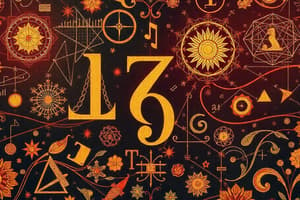Podcast
Questions and Answers
What are the major subdisciplines of modern mathematics?
What are the major subdisciplines of modern mathematics?
- Differential equations, linear algebra, probability, and discrete mathematics
- Logic, set theory, combinatorics, and topology
- Number theory, algebra, geometry, and analysis (correct)
- Arithmetic, calculus, trigonometry, and statistics
What does most mathematical activity involve?
What does most mathematical activity involve?
- Exploration of geometric shapes and their applications in art and design
- Discovery of properties of abstract objects and the use of pure reason to prove them (correct)
- Manipulation of numerical data to find patterns and trends
- Application of statistical methods to solve real-world problems
What do mathematical objects consist of in modern mathematics?
What do mathematical objects consist of in modern mathematics?
- Mathematical laws derived from practical applications
- Physical measurements and observable phenomena
- Empirical data and experimental observations
- Abstractions from nature or entities stipulated to have certain properties (correct)
What does a proof in mathematics consist of?
What does a proof in mathematics consist of?
What are considered as starting points of a mathematical theory in modern mathematics?
What are considered as starting points of a mathematical theory in modern mathematics?
What are the major subareas of mathematical logic?
What are the major subareas of mathematical logic?
What did David Hilbert's program in the early 20th century aim to prove?
What did David Hilbert's program in the early 20th century aim to prove?
What is a common focus of research in mathematical logic?
What is a common focus of research in mathematical logic?
What did the results of Kurt Gödel, Gerhard Gentzen, and others provide partial resolution to?
What did the results of Kurt Gödel, Gerhard Gentzen, and others provide partial resolution to?
What motivated the study of mathematical logic since its inception?
What motivated the study of mathematical logic since its inception?
Flashcards are hidden until you start studying
Study Notes
Major Subdisciplines of Modern Mathematics
- Analysis, algebra, geometry, topology, applied mathematics, number theory, and mathematical logic are key subdisciplines.
Mathematical Activity
- Most mathematical work involves proving theorems and building structures based on axioms, conjectures, and definitions.
Mathematical Objects
- In modern mathematics, mathematical objects consist of entities such as numbers, functions, geometric shapes, and spaces, constructed and studied within different frameworks.
Proof in Mathematics
- A proof consists of a logical deduction from axioms and previously established theorems to arrive at a new result, ensuring the result’s validity through rigorous reasoning.
Starting Points of Mathematical Theory
- Axioms and postulates serve as foundational elements or starting points of a mathematical theory, driving the development of theorems and structures.
Major Subareas of Mathematical Logic
- Subareas include model theory, proof theory, set theory, and recursion theory, each examining different aspects of mathematical reasoning.
Hilbert's Program
- David Hilbert's early 20th-century program aimed to establish a secure foundation for all mathematics through complete and consistent axioms, ensuring that every mathematical truth could be proven within a formal system.
Focus of Research in Mathematical Logic
- Research often concentrates on the foundations of mathematics, investigating the consistency, completeness, and decidability of mathematical theories.
Contributions of Gödel and Gentzen
- Results from Kurt Gödel and Gerhard Gentzen offered partial solutions to problems of consistency and completeness, highlighting limitations of formal systems.
Motivation Behind Mathematical Logic
- The study of mathematical logic arose from the need to clarify the foundations of mathematics and address paradoxes encountered in naive set theory, leading to a deeper understanding of mathematical reasoning.
Studying That Suits You
Use AI to generate personalized quizzes and flashcards to suit your learning preferences.




